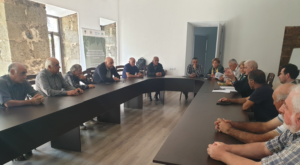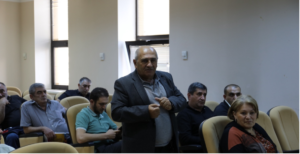
The second half of 2023 has proven busy for RECC and its partners, considering the meetings and related activities within the GEF-financed project on “Sustainable Management of Agricultural Biodiversity in Vulnerable Ecosystems and Rural Communities of Samtskhe-Javakheti Region in Georgia”.
In September, three meetings with the project stakeholders and beneficiaries were organized in Samtskhe-Javakheti region of Georgia. Two of them were targeting farmers to discuss the importance of agrobiodiversity, its potential in the Samtskhe-Javakheti region, goal of the project and advantages of endemic wheat varieties for the region, for the sustainable use of agrobiodiversity and for the development of agrotourism. The representatives of the LEPL “Scientific-Research Center of Agriculture” of the Ministry of Environmental Protection and Agriculture of Georgia with the project representatives also talked about the Agrotechnology of endemic wheat sowing and maintenance and pre-sowing measures, as well as the soil evaluation process – sample taking, soil testing and relevant recommendations to be given to farmers to take proper treatment of their plots and plants. The meetings allowed farmers to receive concrete and detailed answers on land cultivation technologies and soil treatment measures for Meskhetian wheat variety “Akhaltsikhe Tsiteli Doli”. No-till method and its importance for soil was introduced to farmers. Furthermore, they were explained how to prepare the land for no-tillage and why to use this method as current environmental challenges creates burden for farmers.

On September 21, a coordination on awareness raising event on agrobiodiversity and its potential for agrotourism with representatives of local government and interested farmers in Samtskhe-Javakheti Region in Georgia took place in city Akhaltsikhe, Akhaltsikhe Municipality. The event was coordinated among the Department of Biodiversity and Forestry of the Ministry of Environmental Protection and Agriculture of Georgia, Administration of State Representative in Samtskhe-Javakheti Region, Akhaltsikhe City Council and City Hall representatives, Local Representatives from Borjomi, Adigeni, Aspindza, Akhalkalaki, Ninotsminda and Akhaltsikhe of Rural Development Agency, REC Caucasus and local farmers. Its purpose was to underline and crystalize ways to foster greater appreciation of agrotourism and agrobiodiversity as a resource for development and well-being at local and national levels, creation new jobs and healthy food in Samtskhe-Javakheti region and coordination around the mentioned topic among different stakeholders in the region.
Introductory remarks were presented by Ms. Sopiko Akhobadze, Executive Director of REC Caucasus, by Mr. Karlo Amirgulashvili, Head of Biodiversity and Forestry Department of the Ministry of Environmental Protection and Agriculture of Georgia and by Ms. Marina Gachechiladze, Head of Service of the Administration of the State Representative on Samtskhe-Javakheti Region in Georgia. The speech-makers underlined the greater importance of agrobiodiversity for the region and busting economic prosperity of farmers producing endemic varieties of wheat and vine using agrobiodiversity friendly practices and promoting agrotourism in the Region.

Among the main issues raised was to expand the list of beneficiaries and add farmers from Akhaltsikhe, Aspindza and Adigeni municipalities. As a result of the presentations made by the REC Caucasus, focused on the goals and achievements of the project, the farmers attending the meeting expressed interest in participation in the project. The parties agreed to add beneficiaries from Adigeni, Aspindza and Akhaltsikhe municipalities. The issue of field mice was also raised – the attendees voiced their concern that no government programs were available, while mice pose a serious threat during the sowing season, as they eat the seeds. Farmers were allowed platform to discuss their experience related to the production of wheat and vine. They underlined the importance of project and why they decided to restore the traditional vine and wheat varieties.
Overall, the meetings showcased beneficiaries’ commitment to the project. Stakeholders agreed that the efforts in Samtskhe-Javakheti Region will be beneficial to the conservation of the endemic varieties of wheat and vine. Some farmers already begun restoring the old traditions and they are reintroducing the healthy, nutritious and distinctive cuisine based on the production of endemic varieties of wheat, vine, field crops, dairy products and vine.